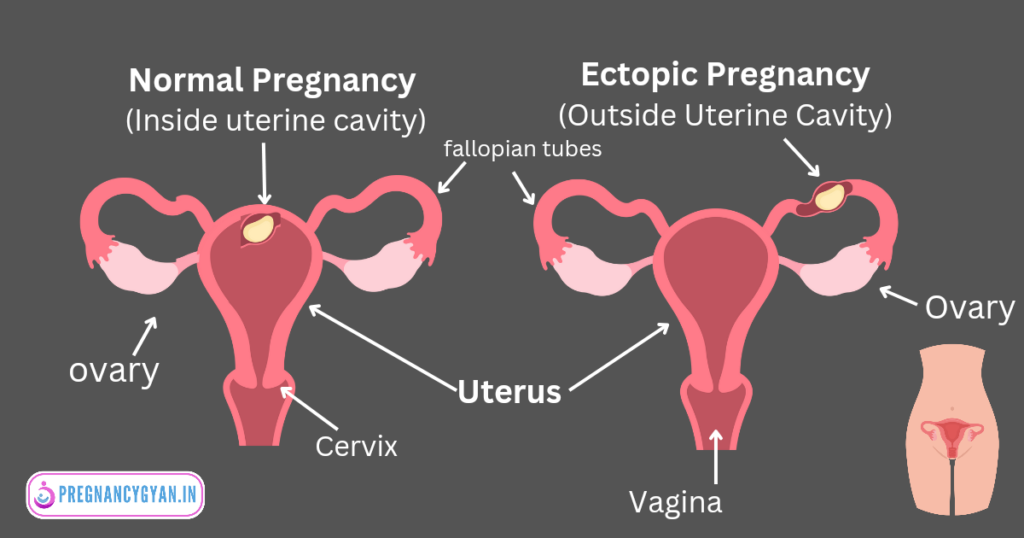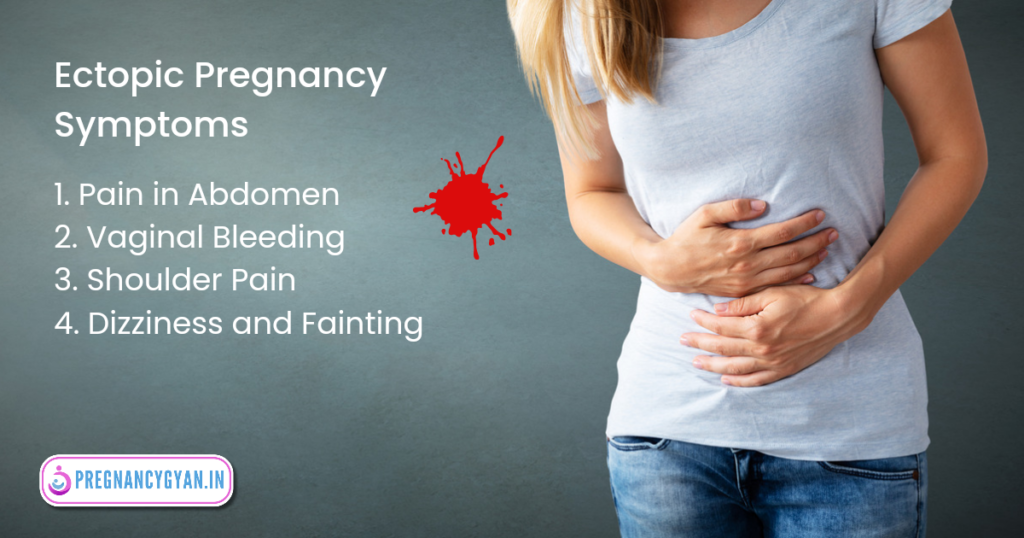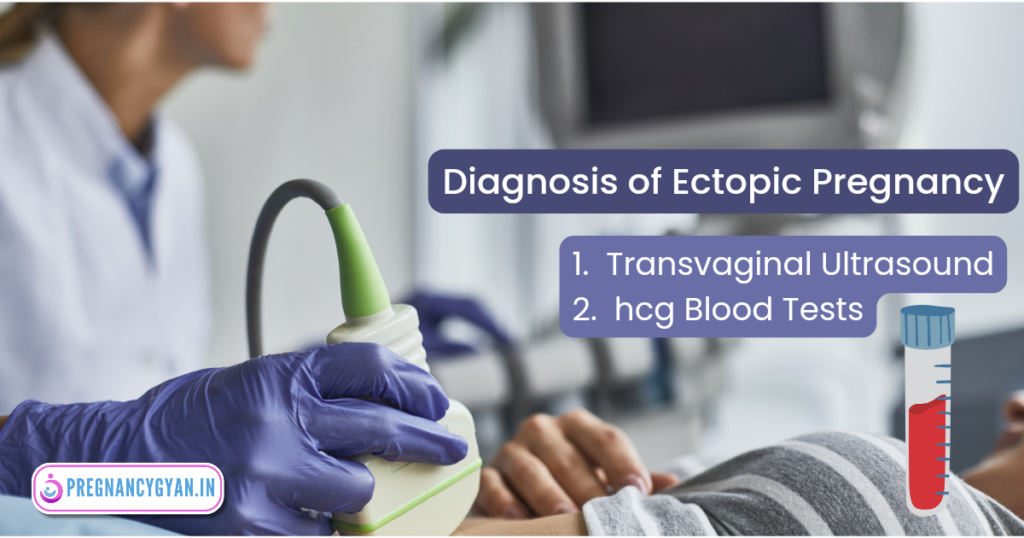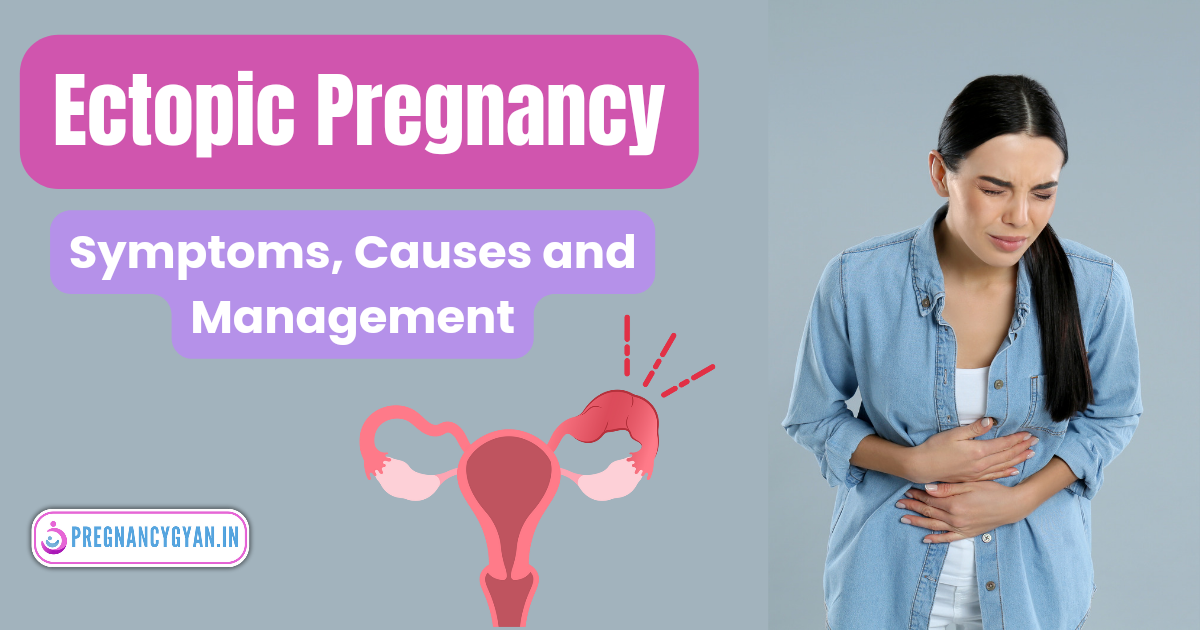इस ब्लॉग को हिन्दी मे पढ़ने के लिए यहाँ क्लिक करे।
Table of Contents
Introduction
Pregnancy is a beautiful phase in a woman’s life, but sometimes, some complications may arise during pregnancy, such as ectopic pregnancy. In this article, we will know what is Ectopic Pregnancy?, Causes of Ectopic Pregnancy, Its symptoms, diagnosis and treatment options.
What is Ectopic Pregnancy?
Ectopic pregnancy is an abnormal condition of pregnancy in which the fetus implants itself outside the uterus, usually in the Fallopian tube (97%). In some rare cases, it may be implanted in the ovary (Ovarian Ectopic), abdomen (Abdominal Ectopic) or in the lower part of the uterus (Cervical Ectopic). Ectopic pregnancy poses a life-threatening risk to mother due to potential risk of rupture and severe internal bleeding.The risk of ectopic pregnancy can range from 0.25% to 2% in all pregnancies. (Reference: FOGSI GCPR on Ectopic Pregnancy)

Ectopic Pregnancy Causes
There can be many factors that can cause ectopic pregnancy. Below are some of the main causes:
1. Damaged Fallopian Tubes:
Due to infection or inflammation in the fallopian tube, the fallopian tube may become blocked or become short or abnormal. Due to which it becomes difficult for the resulting fetus to reach the uterus. Due to this, the fetus does not reach inside the uterus and is mostly located outside the uterus in the fallopian tube.
2.Hormonal Imbalances:
Some hormonal imbalances can affect the movement of the fetus through the fallopian tube into the uterus, causing the fetus to be located in the wrong place.
3. Previous Surgeries:
Women who have undergone pelvic surgery or any lower abdominal surgery for any reason have an increased risk of ectopic pregnancy.
4. Infections:
Pelvic inflammatory diseases and sexually transmitted infections can damage the fallopian tubes, leading to ectopic pregnancy.
5.Infertility, ovulation induction and ART
Artificial Reproductive Techniques and procedures such as IVF
6. Smoking
Smoking is a recognized causative factor for ectopic pregnancy, increasing the risk due to its impact on fallopian tube function and hormonal regulation.
Ectopic Pregnancy Symptoms

It is important to recognize the symptoms of ectopic pregnancy for early diagnosis and treatment. Some important symptoms are given below:
1. Abdominal Pain:
Severe pain on one side of the abdomen is a typical symptom of ectopic pregnancy.
2. Vaginal Bleeding:
There may be light or heavy vaginal bleeding.
3. Shoulder Pain:
In some cases, bleeding inside the abdomen causes irritation of the diaphragm, due to which a woman may experience shoulder pain.
4. Dizziness and Fainting:
Bleeding inside the stomach can cause dizziness, weakness and even fainting.
Keep in mind that if you have symptoms of missed your period, positive pregnancy test, severe pain in the abdomen and bleeding from the vagina then these can be symptoms of ectopic pregnancy. These symptoms are often seen in cases of abortion also. At such times, it is important to immediately consult your doctor or gynecologist and get treatment.
Diagnosis of Ectopic Pregnancy

If a pregnant woman experiences any of the below symptoms, it is necessary to immediately consult a doctor. Ectopic pregnancy is diagnosed by performing the tests given below:
1. Transvaginal Ultrasound:
This is sonography done through the vagina. This gives the doctor information about the location of the fetus.
2. Blood Tests:
Testing the levels of the hormone beta hCG (human chorionic gonadotropin) in a pregnant woman’s blood can help diagnose ectopic pregnancy.
Ectopic Pregnancy Treatment
Treatment of ectopic pregnancy is determined by looking at the duration of pregnancy and the symptoms the pregnant mother is experiencing and treatment is done accordingly. The Treatment of Ectopic Pregnancy includes the following options:
Medical Management:
In cases the fetus is very small (<35 mm), there is no heartbeat or the level of beta hCG hormone in the mother’s body is less than 1500 mIU/mL. Injection Methotrexate can be given. This medicine prevents the development of ectopic pregnancy.
Surgery:
If the ectopic pregnancy has grown large enough or poses a threat to the mother’s health, surgical intervention may be necessary to remove the ectopic pregnancy. There are two types of surgeries in this.
1. Laparoscopic surgery:
If the mother’s condition is stable then laparoscopic surgery can be done. In this surgery, a special instrument called a laparoscope is inserted through small holes on the abdomen. If there is something wrong with the fallopian tubes, they may need to be taken out.
2. Laparotomy:
This surgery is done in emergency cases. Many times an ectopic pregnancy ruptures inside the abdomen (Ruptured Ectopic). In such cases, bleeding occurs inside the abdominal cavity. If there is excessive bleeding, the pregnant woman faints. In such a situation, emergency laparotomy surgery has to be done. In this surgery, the operation is done by making a big incision on the lower abdomen. This special type of surgery is called laparotomy. If treatment is not started immediately, the mother’s life may be at danger in a ruptured ectopic pregnancy scenario.
Conclusion
Ectopic pregnancy is a serious condition that can pose a life-threatening threat to the expectant mother. It requires immediate attention and treatment. Early diagnosis and treatment can prevent complications.
Frequently Asked Questions
What is ectopic pregnancy?
An ectopic pregnancy occurs when a fertilized egg implants and grows outside the uterus, usually in a fallopian tube. It’s a potentially life-threatening condition that requires prompt medical intervention to prevent complications. Symptoms include abdominal pain, vaginal bleeding, and shoulder pain with a positive pregnancy test.
When ectopic pregnancy symptoms start?
Ectopic pregnancy symptoms typically start between the fourth and twelfth week of pregnancy. Early signs may include abdominal pain and vaginal bleeding, which can progress to more severe symptoms if left untreated. Early detection and medical intervention are crucial to prevent complications
How to prevent ectopic pregnancy?
Ectopic pregnancies cannot be prevented in most cases because they often occur due to issues with the fallopian tubes or reproductive system. However, early detection and prompt medical care for conditions like pelvic inflammatory disease (PID) and sexually transmitted infections can reduce the risk of ectopic pregnancy by minimizing damage to the fallopian tubes. Additionally, practicing safe sex and using contraception can help prevent unintended pregnancies, reducing the overall risk of ectopic pregnancy.
How early can ectopic pregnancy be detected by ultrasound?
Ectopic pregnancies can typically be detected by transvaginal ultrasound as early as 4 to 5 weeks into pregnancy. This method allows healthcare providers to visualize the location of the gestational sac and embryo. Early detection is crucial to intervene and treat the condition promptly, reducing the risk of complications.
After ectopic pregnancy surgery when to try to conceive?
After undergoing surgery for an ectopic pregnancy, it is generally recommended to wait for at least one menstrual cycle or until your healthcare provider gives you the green light before trying to conceive again. This allows your body time to heal and reduces the risk of complications in the next pregnancy. However, specific recommendations may vary from case to case, so it’s essential to follow your healthcare provider’s guidance.
What causes ectopic pregnancy?
Ectopic pregnancies are primarily caused by issues that hinder the normal movement of a fertilized egg through the fallopian tube to the uterus. Common causes include fallopian tube damage or scarring due to infections, previous surgeries, or conditions like pelvic inflammatory disease (PID). Other risk factors may include smoking, certain fertility treatments, and hormonal contraception failure.
How to avoid ectopic pregnancy with IVF?
To reduce the risk of ectopic pregnancy during IVF (In Vitro Fertilization), meticulous monitoring and skilled embryo transfer techniques are crucial. Regular ultrasounds and close medical supervision can help detect any potential issues early, allowing for timely intervention to prevent ectopic pregnancies.


1 thought on “Ectopic Pregnancy : Symptoms, Causes and Management”